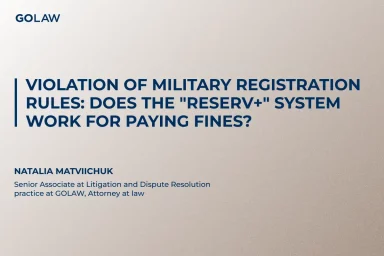Repeal of the Commercial Code: Consequences and Risks for Businesses
This step represents a logical continuation of the Ukrainian legislators’ efforts aimed at unifying legal norms and eliminating contradictions between laws and various regulatory acts in force within Ukraine. From now on, the Civil Code of Ukraine will regulate relations previously governed by the Commercial Code.
Such changes are generally positive, as they simplify and standardize legal relations across different sectors while also aligning Ukrainian law with European legislation. In most EU countries, only civil codes regulate both civil and commercial (business) relations.
However, the repeal of the Commercial Code has significant consequences for businesses across various industries. The CCU contained numerous legal terms that were not established in other regulatory acts, particularly those defining ownership structures of legal entities. Organizational and legal forms such as private enterprises, state enterprises (including treasury, commercial, and non-commercial enterprises), municipal (commercial and non-commercial) enterprises, joint municipal enterprises, subsidiaries, foreign enterprises, enterprises of public organizations (religious organizations, trade unions), and consumer cooperative enterprises have now been abolished.
For businesses with these organizational and legal forms, the following consequences arise: (1) state-owned enterprises must be reorganized into limited liability companies (LLCs) or joint-stock companies (JSCs) within the transition period or face liquidation and transfer of their assets to the state property fund; (2) municipal enterprises may either be reorganized or retain their legal form, depending on the decision of the respective local government body; (3) private enterprises will not be required to undergo reorganization. Once the new law takes effect, the registration of enterprises in the aforementioned forms will be prohibited.
Thus, in the coming years, a mass reorganization of these entities will take place, requiring updates to internal regulations and charter documents. State-owned enterprises, in particular, may face additional difficulties due to the abolition of the concepts of economic jurisdiction and operational management, which will necessitate the redistribution of such property and changes in its accounting on company balance sheets.
The CCU also contained unique provisions regulating the activities of state-owned enterprises and defining the limits of state influence on their operations. The Secretariat of the Energy Community had used these provisions to assess the compliance of Ukraine’s transmission system operator (TSO) with European standards. The repeal of the CCU has raised concerns within the Energy Community Secretariat regarding the independence of the national TSO, arguing that this repeal creates additional risks for the certification of the TSO. One of the key requirements for certification is the separation of the operator from energy producers and suppliers, as well as from political influence — an aspect that was previously covered by the CCU provisions.
Although the Civil Code of Ukraine largely follows a similar approach to regulating most legal relations as the CCU did, its repeal has created legal gaps in certain areas, some of which will only become evident over time. For example, the concept of a “commercial contract” has ceased to exist, despite its significant differences from a civil-law contract. In a commercial contract, the parties were required to agree on additional essential terms: the subject, price, and duration of the contract; otherwise, the contract could be deemed void. In contrast, under civil law, if the price is not stipulated, it is determined based on prevailing market prices for similar goods or services.
Furthermore, the CCU was the primary legal act governing the operation of free economic zones in Ukraine. Additionally, several specific types of business contracts, such as supply contracts, procurement agreements, energy supply contracts, barter contracts, and agency agreements, were regulated exclusively by the CCU and do not have fully equivalent regulation under the Civil Code.
Given the existing shortcomings and gaps in corporate and commercial law, we believe that the next logical step for legislators would be to adopt Corporate and Regulatory Codes of Ukraine. These would replace dozens of separate laws and regulatory acts.
A Corporate Code could regulate the organizational and legal forms of business entities, corporate relations, and provisions currently found in specific laws on joint-stock companies, limited liability companies, cooperatives, and other specialized regulations.
Meanwhile, a Regulatory Code could encompass existing norms on licensing, authorizations, free economic zones, natural monopolies, and other aspects of economic regulation. Certain matters currently regulated by subordinate legal acts — such as the potential liability of a director for the obligations of an LLC in case of bankruptcy — could also be addressed within the Regulatory Code.
At present, it is difficult to fully assess the legal and economic implications of the repeal of the Commercial Code of Ukraine. The CCU was a fundamental regulatory act governing numerous legal relations. Its repeal creates risks of abuse due to legal uncertainty in certain areas and potential hostile takeovers of state and municipal enterprises undergoing restructuring. Some EU countries, such as France, Belgium, and Italy, have retained commercial codes. Therefore, the question of whether such radical changes to Ukraine’s economic framework are appropriate during wartime remains open.
If you need legal advice, please fill out the form below to request it.

Oleksandr Melnyk
Partner, Head of Corporate Law and M&A practice, Attorney at law
- Contacts
- 31/33 Kniaziv Ostrozkykh St, Zorianyi Business Center, Kyiv, Ukraine, 01010
- o.melnyk@golaw.ua
- +38 044 581 1220
- Recognitions
- The Legal 500 2024
- IFLR1000 2024 (International Financial Law Review)
- Legal 500 Green Guide 2024
- TOP-50 Law Firms of Ukraine Ranking | YURPRAKTYKA

Nazarii Zeliak
Associate
- Contacts
- 31/33 Kniaziv Ostrozkykh St, Zorianyi Business Center, Kyiv, Ukraine, 01001
- n.zeliak@golaw.ua
- +38 044 581 1220
Get in touch
To get a consultation, please fill out the form below or call us right away:Sign up to be aware
New achievements are inspired by information. GO further, don’t miss out GOLAW news and legal alerts
Our expertise
-
- Energy and Natural Resources
- Antitrust and Competition
- Banking and Finance
- Compliance, Corporate Governance and Risk Management
- Corporate and M&A
- Criminal and White Collar Defence
- Defense in Anti-corruption procedures and regulations
- Labor and Employment
- Natural Resources and Environment
- Government Relations (GR)
- Insolvency and Corporate Recovery
- Intellectual property
- International trade
- Legal support of business and private Сlients in Germany
- Litigation and dispute resolution
- Private clients
- Real Estate and Construction
- Restructuring, Claims and Recoveries
- Martial Law
- Tax and Customs
-
- Agribusiness
- Aviation
- Chemical industry
- Engineering, Construction and Building Materials
- Natural Resources and Environment
- Financial institutions
- IT and AI
- Industry and manufacturing
- Healthcare industries, Life sciences and Pharmaceuticals
- Media, Entertainment, Sports and Gambling
- Retail, FMCG and E-Commerce
- Transport and Logistics
We use cookies to improve performance of our website and your user experience.
Cookies policy
Cookies settings







